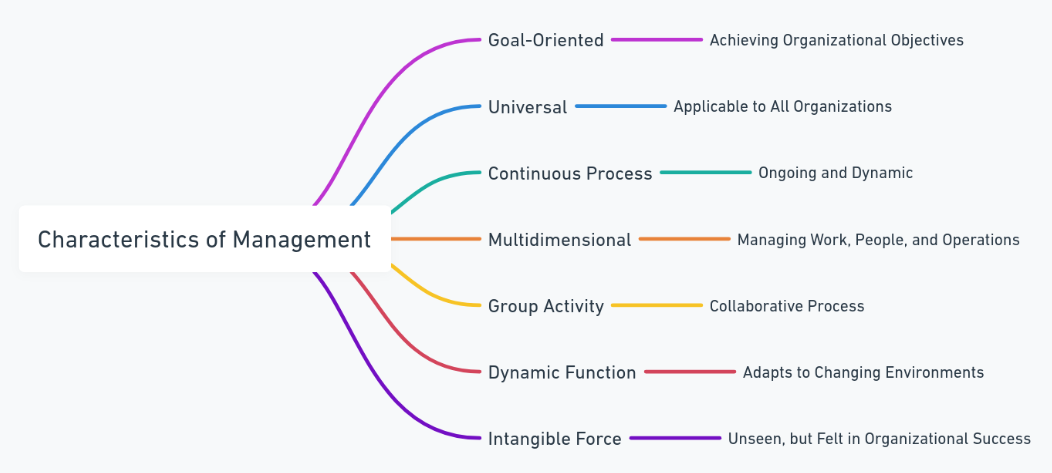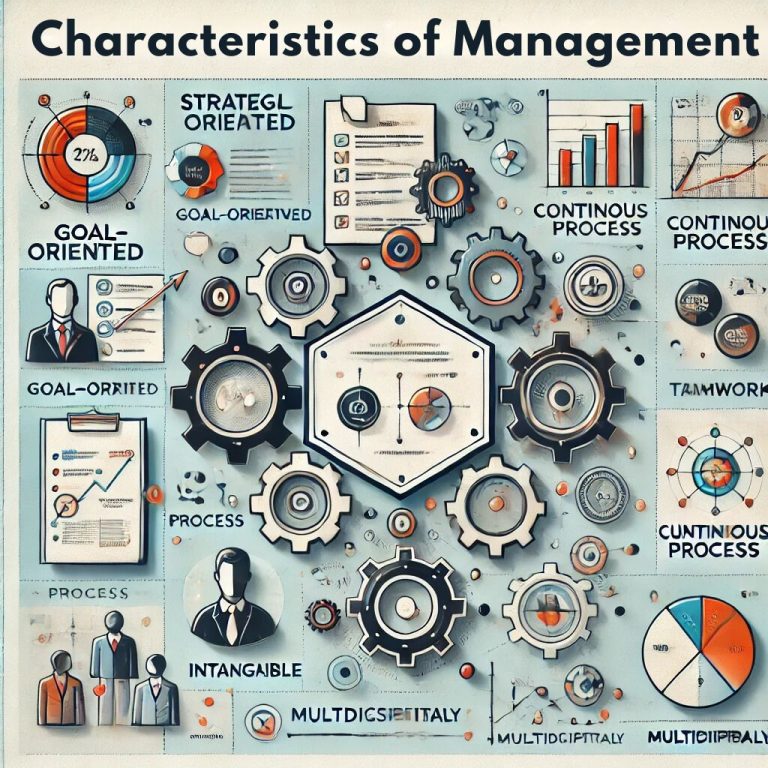The characteristics of management refer to the kind of attributes that define the working of management in any organization. These traits help describe how management guides, coordinates, and controls organizational resources to achieve set goals. Management is a dynamic function forming a vital part of any organization, both business and non-business. It involves planning, organizing, leading, and controlling the effective and balanced use of resources to achieve the objectives of the organization.
Management as an abstract concept is multi-dimensional and involves coordination between various dimensions of human and material resources for success. We shall look at the salient features of management which explain its nature and importance in a structured manner as described below.
What is Management in Business?
Management, therefore, is the art and science of achieving the objectives of an organization through the coordinated efforts of individuals, utilizing the available resources in an efficient and effective manner. Planning, organizing, staffing, leading, and controlling are included in management activities as a whole to achieve the objectives of the organization.
Business management is a process through which activities are conducted to optimize the exploitation of resources available to a firm, human, or material devising strategies that foster sustainability and profitability. It is an important function at all organizational levels, actually running from the level of top management, clearly aligned with strategic goals, down to an almost ‘operational’ level of management, maintaining control of day-to-day operations.

Characteristics of Management
Being a discipline, management exemplifies many salient features. These features of management reveal the wide scope and function of management, from goal setting to ensuring smooth daily operations.
1. Goal Orientation
Management is largely goal-oriented. The core of management actually lies in the formulation and realization of organizational goals. Every activity that is undertaken in an organization is pegged towards a certain goal or objective. Managers hence focus on ensuring that all resources used are human resources, material resources, or financial resources for the set objectives.
Efforts by organizations toward the achievement of some specific objective reflect the goal orientation of the management. For example, for a production company, the primary goal would likely be to achieve the maximum output at the lowest cost, and all the managerial efforts would be aligned around it.
2. Universality
It means management principles apply in every type of organization, from business to governmental, non-profit, and educational institutes. It is universal in two ways. It applies across all sectors, as well as across geographical regions.
Wherever the size, location, or nature of an organization is, the need arises for management in each case. The managerial skills required by the small startups are equal in number to the large multinational corporations.

3. Continuous Process
Management is a cyclical process. It does not end when it formulates policy but remains active, always undergoing assessment, modification, and application. Planning, organizing, leading, and controlling processes are interdependent processes that require constant monitoring and alteration if there occur changes in conditions or goals.
For example, management in an organization would constantly review and make necessary alterations in the strategy to suit performance reviews and market conditions to ensure that all functions remain operative and move in step with the goals.
4. Interdisciplinary Nature
Management draws on multiple disciplines like economics, sociology, psychology, and even technology, hence making it an interdisciplinary subject. Management theories and practices have mixed insights with these fields to maximize decision-making and problem-solving in possible actions.
For example, motivation theories that come from psychology help the manager understand the behavior of the employees. The principles of economics guide the proper allocation of resources.
5. People-Centric
Management is intrinsically people-centered. The greatest asset of an organization is its human resources, and the proper exploitation of this human potential is what management does best. Management means motivating, leading, and communicating with employees to realize the desired performance.
This characteristic underscores the importance of leadership and interpersonal relationships in management since management is likely to succeed only when it can manage people successfully.
6. Resource Optimization
Effective management is more or less an optimization of resources. The use of limited resources in an organization limits it, and management’s job is to ensure optimal usage. Be it financial resources, human resources, or physical assets, the management ensures that wastage is at a minimum and optimality is at its highest.
Resource optimization helps ensure the best possible outcomes with expenditure. For example, a manufacturing firm focusing on raw material usage, labor, and technology ensures maximum output at minimal cost.
7. Adaptability
Management would work only if it is adaptive and flexible enough to respond to a changing business environment. Effective responsiveness to internal and external environmental change is crucial. Whatever the change, be it by market factors, technological shifts, or even inward structural changes, management must be adaptive to adapt to these changes.
A good manager will scan the environment and make all adjustments necessary in the organization to remain competitive.
8. Ethical Responsibility
Management also ensures compliance with ethics in addition to meeting the business goals. The management team ensures that an organization remains very much within the limits of legal, social, and moral expectations. Examples include fair treatment of employees, compliance with rules, and environmental-friendly practices that do not harm the environment.
For example, today’s businesses are measured based on CSR.
9. Multifaceted
Management is a diversified activity because different work assignments fall under it. It ranges from strategic decision-making to mere oversight of day-to-day operations. Managers undertake different kinds of activities, beginning with planning and decision-making to problem-solving and conflict resolution.
There are days when the manager is about to perform anything, including managing the workforce, financial planning, or product development. Thus, the scope of management responsibilities is very wide.
10. Group Activity
Management is a group activity by its nature. It relates to coordinating efforts of people towards the attainment of specific common goals within an organization. Managers should, therefore, facilitate efforts as well as work at enhancing teamwork among various employees or departments so that their inputs combine to yield the realization of the given objectives.
Teamwork, delegation, and communication are also some of the crucial elements of group activity in management because they enable coordination of effort in achieving common objectives.
Conclusion
In a nutshell, the characteristics of management tell us about its function and importance in an organization. Management is dynamic and goal-oriented and has been meant to optimize resources while guiding human efforts toward attaining particular organizational objectives. It is interdisciplinary, adaptive, and ethically applicable to nearly all kinds of settings. This explains why management in the form of management plays a crucial role in any type of organization ranging from small businesses to global corporations in its steady course and through collaboration.
Characteristics of Management FAQs
What are the main characteristics of management?
The main characteristics of management include goal orientation, universality, adaptability, people-centricity, and resource optimization.
How does management optimize resources?
Management optimizes resources by ensuring efficient use of financial, human, and material resources to achieve maximum output with minimum waste.
Why is management considered a group activity?
Management is a group activity because it involves coordinating and directing the efforts of individuals within an organization towards a common goal.
What is the ethical responsibility of management?
Ethical responsibility involves ensuring that the organization operates within legal and moral standards, including fair treatment of employees and sustainable practices.
How does adaptability play a role in management?
Adaptability is crucial in management as it allows an organization to respond effectively to changes in the environment, ensuring long-term success.


